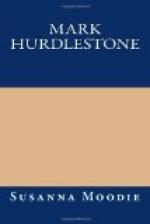There was not a drop of the milk of human kindness in his composition. Regardless of his own physical wants, he despised the same wants in others. Charity sued to him in vain, and the tear of sorrow made no impression on his stony heart. Passion he had felt—cruel, ungovernable passion. Tenderness was foreign to his nature—the sweet influences of the social virtues he had never known.
Mark Hurdlestone hated society, and never mingled in festive scenes. To his neighbors he was a stranger; and he had no friends. With power to command, and wealth to purchase enjoyment, he had never travelled a hundred miles beyond the smoke of his own chimneys; and was as much a stranger to the world and its usages as a savage, born and brought up in the wilderness. There were very few persons in his native place with whom he had exchanged a friendly greeting; and though his person was as well known as the village spire or the town pump, no one could boast that he had shaken hands with him.
One passion, for the last fifty years of his unhonored life, had absorbed every faculty of his mind, and, like Aaron’s serpent, had swallowed all the rest. His money-chest was his world; there the gold he worshipped so devoutly was enshrined; and his heart, if ever he possessed one, was buried with it: waking or sleeping, his spirit for ever hovered around this mysterious spot. There nightly he knelt, but not to pray: prayer had never enlightened the darkened soul of the gold-worshipper. Favored by the solitude and silence of the night, he stole thither, to gloat over his hidden treasure. There, during the day, he sat for hours entranced, gazing upon the enormous mass of useless metal, which he had accumulated through a long worthless life, to wish it more, and to lay fresh schemes for its increase. “Vanity of vanities, all is vanity,” saith the preacher; but this hoarding of money is the very madness of vanity.
Mark Hurdlestone’s remarkable person would have formed a good subject for a painter—it was both singular and striking.
His features in youth had been handsome, but of that peculiar Jewish cast which age renders harsh and prominent. The high narrow wrinkled forehead, the small deep-set jet-black eyes, gleaming like living coals from beneath straight shaggy eyebrows, the thin aquiline nose, the long upper lip, the small fleshless mouth and projecting chin, the expression of habitual cunning and mental reservation, mingled with sullen pride and morose ill-humor, gave to his marked countenance a repulsive and sinister character. Those who looked upon him once involuntarily turned to look upon him again, and marvelled and speculated upon the disposition and calling of the stranger.
His dress, composed of the coarsest materials, generally hung in tatters about his tall spare figure, and he had been known to wear the cast-off shoes of a beggar; yet, in spite of such absurd acts, he maintained a proud and upright carriage, and never, by his speech or manners, seemed to forget for one moment that he held the rank of a gentleman. His hands and face were always scrupulously clean, for water costs nothing, and time, to him, was an object of little value. The frequency of these ablutions he considered conducive to health. Cold water was his only beverage—the only medicine he ever condescended to use.




